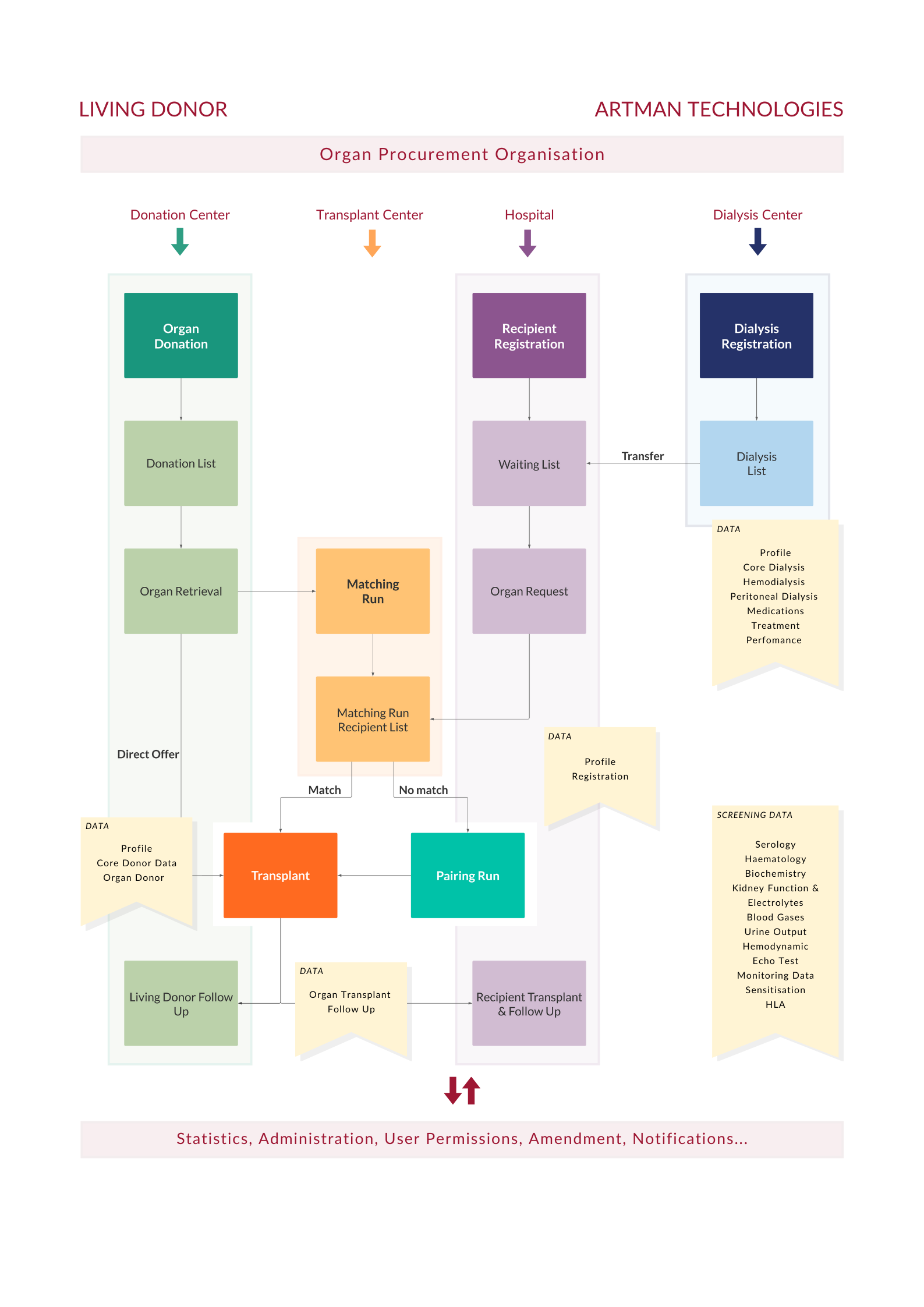Organ Management System
Database application is fully functional and currently running online for national healthcare sectors. The Organ Management Module includes the entire process of transplantation at national level. National registries collect data on recipients and donors, allowing for fair and quick matching. Following the surgery, there is a follow up system notification system to monitor recipients/donors in the months and years following the transplant. Organs for transplantation include the kidneys, pancreas, liver, heart, lungs and bowel.
Kidney
Liver
Heart
Pancreas
Lung
Bowel
Transplantation
Organ transplantation is a life-saving medical procedure that involves the transfer of organs from a donor to a recipient. The recipient is typically someone who suffers from organ failure, which can be caused by a range of conditions including kidney disease, heart failure, liver failure, or lung disease. Data is collected for all new recipients, including blood group and medical conditions through forms in the application. They are then registered into the National Waiting List waiting for a appropriate donor.
All potential donor cases are logged and once confirmed, they are registered as active donors in the donation database. This includes multi organ, live and cadaveric/deceased donors. Organ donation is a voluntary decision made by the donor or their family members.
The module also manages organ offers from Matching Algorithms and allows rejections and re-registrations. A Follow Up is provided post transplantation.
Living Donor
Living donors are individuals who donate one of their organs or a part of an organ while they are still alive. This can include kidney donation, liver donation, lung donation, and pancreas donation. Living donors can donate to a family member, friend, or even a stranger who is in need of an organ transplant. This can be conducted using the Matching Run algorithm (to ensure they are a match) and through direct transfer to the recipient in the application.
Deceased Donor
Deceased donors are individuals who have passed away and have donated their organs for transplantation. After a person passes away, their organs can be recovered and used to save the lives of others. Deceased donors can donate multiple organs, including the heart, lungs, liver, kidneys, pancreas, and small intestine. The Matching Run algorithm allocates and offers the organ(s) of the donor to recipients on the National Waiting List.
Matching Run
The integrated software features a sophisticated matching algorithm that uses advanced data analytics to identify the most suitable donors for each recipient. It takes into account a host of variables, including age, blood type, tissue compatibility, and medical history, to ensure that the matching process is as effective and equitable as possible. This ensures that organs are allocated fairly, quickly and efficiently, reducing waiting times and improving patient outcomes. This increases compatibility and decreases the amount of rejected organs. Customised criteria can be applied for each organ.
Follow Up
The application system generates auto notifications for recipients needing follow up, for example 3 months and 1 year after transplantation. The module allows for transfers to different Follow Up centers and re-registrations to Waiting List after rejection. Live donors Follow Up is also available.
Recipient Forms
Profile Form
The purpose of this form is to collect general profile information about the patient. Items include identification, contact details and patient demographics.
Recipient Registration Form
The purpose of this form is to collect recipient registration information. Items include registration, organ requests, comorbidities, insurance and sponsor information.
Transplant Forms
The purpose of this form is to collect transplant information immediately after transplantation occurs. Items include transplant details, surgery data, immunosuppressive protocols and organ specific information.
Follow Up Form
The purpose of this form is to collect follow up information to monitor the recipient’s health in the months and years following the transplant. Items include transplant details, follow up data, acute rejection incident reporting, clinical status, post-transplant complications and organ specific information.
Laboratory Forms
The purpose of these forms is to collect laboratory results information. Laboratory tests include for example Serology, Haematology, Biochemistry, Sensitisation, Kidney Function and Electrolytes.
HLA Form
The purpose of these forms is to collect HLA information. HLA molecules play a crucial role in organ transplantation, as they determine whether a transplanted organ is recognized as self or non-self by the recipient’s immune system. The HLA form is detailed, easy to use and includes dynamic validation.
Profile Form
The purpose of this form is to collect general profile information about the patient. Items include identification, contact details and patient demographics.
Recipient Registration Form
The purpose of this form is to collect recipient registration information. Items include registration, organ requests, comorbidities, insurance and sponsor information.
Transplant Forms
The purpose of this form is to collect transplant information immediately after transplantation occurs. Items include transplant details, surgery data, immunosuppressive protocols and organ specific information.
Follow Up Form
The purpose of this form is to collect follow up information to monitor the recipient’s health in the months and years following the transplant. Items include transplant details, follow up data, acute rejection incident reporting, clinical status, post-transplant complications and organ specific information.
Laboratory Forms
The purpose of these forms is to collect laboratory results information. Laboratory tests include for example Serology, Haematology, Biochemistry, Sensitisation, Kidney Function and Electrolytes.
HLA Form
The purpose of these forms is to collect HLA information. HLA molecules play a crucial role in organ transplantation, as they determine whether a transplanted organ is recognized as self or non-self by the recipient’s immune system. The HLA form is detailed, easy to use and includes dynamic validation.
Donation Forms
Profile Form
The purpose of this form is to collect general profile information about the patient. Items include identification, contact details and patient demographics.
Core Donor Data Form
The purpose of this form is to collect core donor information. Items include donor details, pooled information, donor condition, observations, past medical history and drugs.
Organ Retrieval Form
The purpose of this form is to retrieve organs and collect retrieval information. Items include organ status, date, unit, relation and reason.
Organ Donor Forms
The purpose of this form is to collect information for the specific donor organ. Items include anatomical details, appearance and organ damage.
Laboratory Forms
The purpose of these forms is to collect laboratory results information. Laboratory tests include for example Serology, Haematology, Biochemistry, Blood Gases, Monitoring, Urine Output, Hemodynamics, Echo Test, Kidney Function and Electrolytes.
HLA Form
The purpose of these forms is to collect HLA information. HLA molecules play a crucial role in organ transplantation, as they determine whether a transplanted organ is recognized as self or non-self by the recipient’s immune system. The HLA form is detailed, easy to use and includes dynamic validation.
Profile Form
The purpose of this form is to collect general profile information about the patient. Items include identification, contact details and patient demographics.
Core Donor Data Form
The purpose of this form is to collect core donor information. Items include donor details, pooled information, donor condition, observations, past medical history and drugs.
Organ Retrieval Form
The purpose of this form is to retrieve organs and collect retrieval information. Items include organ status, date, unit, relation and reason.
Organ Donor Forms
The purpose of this form is to collect information for the specific donor organ. Items include anatomical details, appearance and organ damage.
Laboratory Forms
The purpose of these forms is to collect laboratory results information. Laboratory tests include for example Serology, Haematology, Biochemistry, Blood Gases, Monitoring, Urine Output, Hemodynamics, Echo Test, Kidney Function and Electrolytes.
HLA Form
The purpose of these forms is to collect HLA information. HLA molecules play a crucial role in organ transplantation, as they determine whether a transplanted organ is recognized as self or non-self by the recipient’s immune system. The HLA form is detailed, easy to use and includes dynamic validation.


